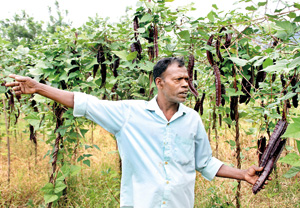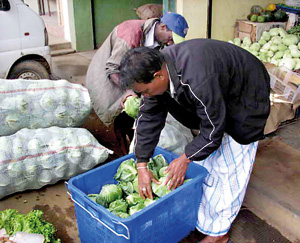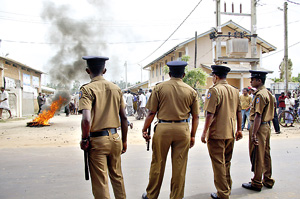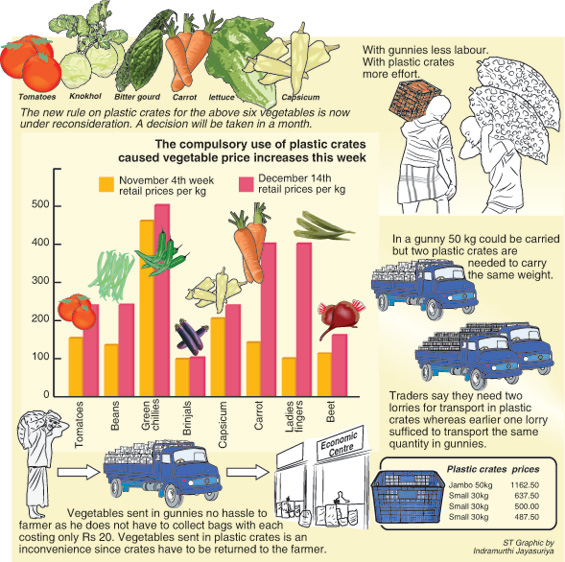Pandemonium reigned last week, when angry traders, transporters and farmers protested against the law on ‘plastic crates’, by closing down roads and economic centres, which created a severe shortage and a consequent price hike in vegetables, during the festive season.
 |
| Farmer H. A. Thilakeratne complains that he has suffered a loss of Rs. 50,000. Pix by Indika Handuwala |
Despite the protests and practical issues faced by farmers and vendors, the government is determined to go ahead with the law, after giving them a month’s respite.
The use of plastic crates to transport fruits and vegetables was made compulsory with effect from December 11 midnight.
On a raid by the Consumer Affairs Authority (CAA) on Monday (12), 40 lorries transporting vegetables, other than in plastic crates, were seized, and the drivers were fined after being produced in courts.
According to the regulation, individuals found guilty will be fined up to Rs 10,000 each, while the fine for an institution could go up to Rs 100,000.
This triggered protests by farmers and traders in the economic centres for about three days, creating a shortage of vegetables in the market.
Agitated farmers and traders in Anuradhapura, Bandarawela, Colombo, Dambulla, Hambantota, Kurunegala and Nuwara Eliya, Ranna were on the streets burning tyres and spoilt vegetables amidst police tear-gassing.Protests opposite the Fort railway station also resulted in traffic congestion in the city.
As the crisis worsened, President Rajapaksa called for a discussion with the farmers and traders on Wednesday (December 14). The discussion ended with the President ordering a one-month grace period, and agreeing to amend the Gazette notification exempting certain types of vegetables made mandatory for transport in plastic crates.
Dambulla Economic Centre is one of the main trade hubs for fresh vegetables, with the majority of farmers delivering their goods there to be distributed and sold in the major towns.
Dambulla Economic Centre President, U.R.D. Nandasiri told the Sunday Times though the concept to reduce spoilage was good, the government had failed to address practical issues that arise with it.
“The law should not have been introduced in an ad-hoc manner, with only a few vegetables as a start. The Trade Ministry should have done studies and trials prior to the implementation of the law,” he said.
He said that, in Dambulla, during the two-day closure of the economic centre, about Rs. 300 million worth of vegetables were destroyed, as they were not able to transport them.
“The government says that 40% of the vegetables are spoilt due to improper packing, while in fact, it is only about 5% that is spoilt,” he added.
According to him, a gunny sack can hold about 50 kg of vegetables, while a plastic crate can hold only about 28-30 kg.
W.G. Muthubanda (62), a farmer cultivating winged beans and capsicum for more than four decades said, “Our farmers are the poorest, and some cultivate 50 kg of vegetables per day. As there is no proper agricultural policy, on many occasions, our vegetables are sold at a cheap rate. This crate law will affect small-scale farmers severely.”
He said most of the time gunny sacks are not returned, while plastic crates should be returned, which would be an extra cost. “The minister should visit the rural areas and witness the struggle of the poor farmers. Road conditions are in a deplorable state, especially in the central hills. Even if the crates are given to us free of charge, transporting in them would be a difficult task,” Muthubanda said.
N.P. Ranasinghe, a farmer from a village in Dambulla said he is worried about the safety when transporting vegetables in plastic crates, as gunny sacks are sealed before being sent to the economic centre.
“These crates do not have a cover, therefore, there is a possibility of vegetables being stolen in transport. I use a rented Dimo lorry to transport my vegetables, and carry 15 gunny sacks in one trip.
I tried with crates and found I have to do two trips,” he said, adding that more space and extra transport cost will be included in the retail prices of vegetables.
H.A. Tilakaratne (52), another farmer, complained that, during the two days the Dambulla economic centre was closed, he suffered a loss of Rs. 50,000. “These plastic crates costs between Rs 500-Rs 1000, while a gunny sack can be purchased for Rs 20-Rs 30,” he said.
According to the special Gazette issued on October 2011, the vegetables that should use plastic or wooden crates are tomatoes, beans, bitter gourd, cauliflower, lettuce, sponge gourd, brinjals, yard long beans, cabbage, knolkhol, capsicum, green chillies, winged beans, bush tomato, radish, cucumber, onion leaves, cucumber, carrot, ladies fingers, bell pepper, spinach, beet and spring onions.
The fruits are papaya, rambutan, pears, passion fruit, mango, oranges, mangoosteen, guava, pomegranate, gadu-guda, avocado, grapes and strawberries.
In July this year, markets were awash with vegetables at very low prices. But due to the shortage, a kilo of carrots went up to Rs 400 from Rs 140, beans from Rs 135 to Rs 240, while tomatoes went up from Rs 153 a kg to Rs 240. Traders also fear that the shortage may lead to an increase in vegetable prices during the festive season.
Vice President- Pettah Manning Market Trade Union, Thakshila Kumara said, “The implementation of the law will see more lorries coming to Colombo, or making more trips which would result in additional transport cost.
“It is good that the government has decided to cut down the number of vegetables that needs to be transported in plastic crates. Vegetables such as capsicum, salad, tomatoes, bitter gourd, knolkhol and carrots should be transported with care, but vegetables such as beet, brinjals and radish need not be carried in crates,” he said.
K. Joseph (42), a porter (natami) said, “Gunny sacks are easy to carry, while a crate would be a painful task.”
“As the quantity of vegetable in a crate is less, we will have to do many rounds. It is easy to carry and release the load when the vegetables are in gunny sacks,” he said.
With the vegetables held up coming into the market by yesterday the prices of some in the Manning Market, Pettah have come down. Loads of vegetables in sacks are stacked in the stalls in the market. However tomatoes at Rs. 280 per kg, green chillies at Rs. 250 per kilo, and carrots at Rs. 170 per kilo are some which are still priced high.
Johnston’s stand in a nutshell
 |
| The minister addressing the media on Tuesday. Pic by Susantha Liyanawatte |
Trade Minister Johnston Fernando responded to allegations and related issues that were highlighted following the implementation of the crate law.
Government’s stance
“The government has neither scrapped nor withdrawn the rule. The rule exists and will come into force in a month’s time. This is not my personal decision; I am only the Minister of Trade in the government. This was taken as a collective decision by the State.”
Why plastic crates are compulsory
“Annually, Rs. 20 billion is wasted due to poor packing and improper transportation. About 20-30% of fruits and vegetables go waste, while another 10% is discarded, as they don’t meet the standard sizes. Lorries that can hold 5,000 kg of vegetables, are loaded with 10,000 kg of vegetables, leading to a lot of spoilage.”
“The proposal came four years ago and was approved by the Cabinet last year”.
Whether relevant parties were consulted prior to the implementation of the law?
“The special Gazette was issued in 2010, when traders first requested for three months and then six months. We have given them a whole year to start using crates”.
Practical problems in transporting vegetables and fruits
“Once the law is implemented, both farmers and traders would get used to it. Plastic crates are available at economic centres at a concessionary rate”
“The Ministry is in the process of organising two and four-wheel carts for porters’ convenience, once the plastic crate law is implemented.”
Meeting between President Rajapaksa and stakeholders
At a meeting with the President on Wednesday, the farmers and traders complained of irregularities in the vegetable trade, including high transportation costs and the purchase of vegetables from farmers at a very low rate.
The President said a State Vegetable Corporation will be established and price controls introduced if these irregularities continue.
There was an agreement for amendments to the rule relating to exemptions for vegetables such as beet, radish, winged beans and brinjals.
The Institute of Post Harvest Technology, under the Agriculture Ministry, is to submit a report within 25 days, whether beans, both green and long should be transported best in crates or sacks.
Allegations of commissions received over a crate deal
Members of the Opposition and some National Freedom Front MPs accused the Trade Minister of accepting commission from manufacturers of plastic crates. The Ministry does not supply or purchase plastic crates, but has made arrangements to provide them at a reasonable rate at economic centres.
Plastic Pandora’s veggie box opens islandwide
 |
| Vegebtables being packed into plastic crates at the Nuwara Eliya Economic Centre |
It was not only farmers and traders in economic centres and Manning Market who protested against the law. The Sunday Times provincial correspondents report on protests held islandwide against the law.
Kalpitiya
Villagers in Daluwa, Mampuriya, Ethalai, Norochcholai, Nawathkaduwa Narankalliya and other villages in Kalpitiya were shocked and angered by the law.
The protesting villagers charged that the gunny sack, the contemporary farmer-friendly packing material has been carrying vegetables grown in about 20,000 acres, to the main cities and towns for many years. The daily production from these areas being about 300,000 kg.
U.S.N. Amanullah, a farmer said small-scale farmers are the most affected, especially with the additional transport cost. “This is injustice done to the small-scale farmer who is struggling with the little money earned on a daily basis,” he said.
L. Nishantha, another farmer said, while 12,000 gunny sacks can be loaded in a lorry, only half that amount can be accommodated if the change is effected. “This means the cost doubles. Invariably, the surplus will have to be borne by the consumer. The change should have been done methodically, not overnight,” he said.
 |
| Protestors burn tyres in Norochcholai |
Villagers in NCP
Villagers in the rural areas of the North-Central province were dismayed by the news that gunny sacks were prohibited in transportation of vegetables, resulting in angry protests in these villages.
A farmer from Saliyawewa, H.D. Mahindasena said that the new method of packing is not profitable to them, as the crates need to come back, unlike gunnies which are disposable.
L. Piyatissa from Rajanganaya said that a farmer cultivating papaya needs about 50 baskets daily, while the income is very low.
“We tried to find at least a few crates to transport our fruits last week, but unfortunately we couldn’t find any,” he said.
Nuwara Eliya
District Secretary- Nuwara Eliya, D.P.G. Kumarasiri said the Nuwara Eliya Economic Centre needs about 25,000 plastic crates to transport vegetables to Pettah, Narahenpita, Meegoda and Welisara economic centres, and that he has requested traders to make all their purchases during the next few weeks.
President- Nuwara Eliya Economic Centre Trade Association, Lalith Karunaratne said there are a few practical issues that arise in the use of plastic crates.
“There are vegetables that do not need plastic crates, while vegetables that are easily perishable should not be stacked in boxes,” he said.
Shelton Hettiarachchi

|






